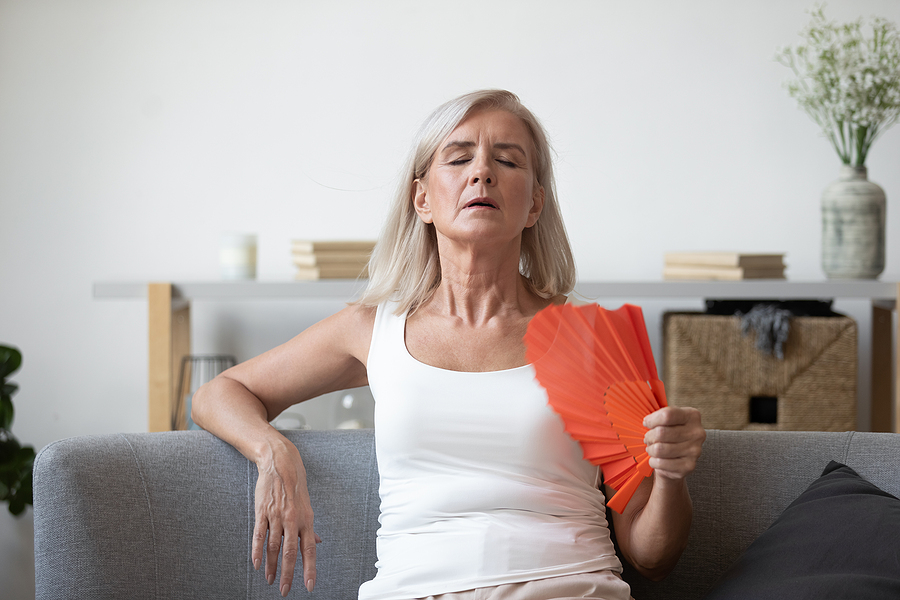Updated 04/21/2021
Cindy, a long-time client at my clinic, came to see me because of new symptoms that were driving her crazy.
She told me that she couldn’t even enjoy hanging out with friends because she’d be in the middle of a stimulating conversation when a sudden wave of heat would flood her body, making it impossible to focus. “I feel tingling and burning from head to toe, and the instant pools of sweat are so embarrassing” she said.
And that’s not the only time problem she was having with temperature regulation. She said she was also waking up from a sound sleep, desperately kicking off the blankets and absolutely drenched in sweat.
If you’ve ever had a hot flash, you know exactly how Cindy is feeling, and how disruptive they can be to daily life.
When I ask my patients which menopausal symptoms are the most annoying and disruptive in their lives, I get a wide range of answers: fuzzy thinking, weight gain, anxiety, disrupted sleep, decreased libido or painful sex, and mood swings are all mentioned from time to time.
But it seems that one symptom is nearly always at the top of the “most bothersome symptoms” list: hot flashes.
How common are hot flashes, and how long will I have them?
Research shows that more than 80% of women experience hot flashes and night sweats before or after menopause, which means most of us will experience them at least once. And for many women, hot flashes disrupt their lives for far longer than they’d like.
If it seems like these extreme temperature shifts are not showing any signs of going away, you’re not alone.
A 2015 study published in JAMA Internal Medicine found that these vasomotor symptoms (or VMS) last, on average, for more than seven years. For some ethnicities, the average duration can be over ten years. That’s a long time to be kicking off blankets and peeling off clothing layers!
But here’s the good news: You don’t have to suffer through a decade of misery!
While conventional medicine might say this type of symptom is something you just have to live with, or offer antidepressants or hormone replacement therapy (HRT) as the only solution, we in functional medicine know there are other ways!
At the Women to Women clinic, we’ve been helping our patients manage their hormonal imbalances and regain control of their health – and their body temperatures – for decades – and we’ve been helping women on-line for more than 15 years!
Let’s look a little more closely at where hot flashes and night sweats originate. Then I’ll discuss what you can do to feel better now – not ten years from now!
What causes hot flashes and night sweats?
Cindy’s stories demonstrate how awkward and uncomfortable hot flashes and night sweats can be. If you’re experienced them yourself, you already know this first hand!
Many women manage these troublesome symptoms by constantly resetting the thermostat, avoiding spicy foods, or opting for HRT. But HRT has been linked to breast cancer, so it shouldn’t be taken lightly. And there are other options!
These symptoms are caused by hormonal imbalance. When you are experiencing them, it means that your systems and hormones are out of alignment: your symptoms are a message from your body asking you to pay attention.
During our transition before and after menopause, our hormones are shifting and the ratio of estrogen to progesterone and testosterone is constantly changing. When these ratios get out of balance, we experience symptoms such as hot flashes and many other well-known menopausal complaints.
It IS possible to bring these hormones back into a healthy balance naturally.
Natural Treatment for Hot Flashes and Night Sweats
While nutritional supplementation and support is a critical component, it’s not as simple as just popping a pill and making it all go away; to receive optimal relief and restore health so that you can feel like yourself again, you’re going to need to make some simple lifestyle and diet changes as well.
That’s because our sex hormones, estrogen, progesterone and testosterone, are secondary hormones and our primary hormones of insulin, adrenalin and cortisol take precedence when it comes to getting the support and nutrition your body needs to perform optimally.
If these hormones are out of balance, your body will focus on restoring harmony there first and your best efforts to address your menopausal symptoms may not yield the results you are seeking.
For example, insulin controls your blood sugar levels so if your diet is full of sugar, starch and carbohydrates, your menopausal complaints may well be more severe, and you might be dealing with them a lot longer.
Similarly, if you live a very stressful chaotic life and you don’t take time for relaxation, meditation and self-care, you may experience adrenal fatigue because your adrenaline and cortisol will be out of balance. If there is an imbalance in any of the primary hormones, it will slow down symptom relief.
But you have quite a bit of control over this! By making those simple diet and lifestyle changes I talked about, you can begin to feel much better.
And these changes won’t just alleviate hot flashes – they’ll also have a positive impact on weight gain, mood changes and all of your other menopausal symptoms. Sounds great, right? So let’s get into specifics.
Eating to alleviate symptoms
When you are eating with intention, you can make the best choices for your body.
The first step is to minimize processed foods and sugar and instead opt for fresh whole foods: eating grass-fed meats, wild caught salmon and omega-3 rich fish, and organic produce whenever possible goes a long way towards restoring balance and helping you feel better.
Avoid vegetable oils and other processed oils high in omega 6. These are often present in boxed and processed foods, which is why whole foods are a much better choice.
Sugar has a major impact on your hormones, so cutting back is critical. And you may be eating far more sugar than you know. It hides in so many foods – including condiments!
It’s important to watch out for these hidden sugars such as high fructose corn syrup that wreak havoc on your insulin levels. Read labels carefully and know the many aliases that sugar goes by!
You can learn more about sugar in my article here.
Reduce stress and feel better
In that 2015 JAMA study, researchers also found that lifestyle concerns and psychosocial factors have an impact on how disruptive hormonal imbalance symptoms may be.
In other words, the scientists are saying that if you have stress or distress in other areas of your life, it is more likely to show up in the form of physical symptoms than if you don’t. I have seen this first-hand in my practice for years.
Women in the study who experienced symptoms for longer periods of time included those who were under financial strain, had higher levels of perceived stress, were experiencing more depression or anxiety, seemed to be more sensitive to their symptoms, and those who experienced symptoms at younger ages.
As you can see, it’s important to reduce stress from your life by making changes where you can. Only you know what that means for you – but one thing that’s true for everyone is you have to make time for joy. That means finding activities you truly love, and carving out time for them no matter what.
Stress relief practices like meditation, yoga, tai chi, journaling, and deep breathing work wonders for many. Eating well and getting a good night’s sleep are also essential in reducing stress.
Address habits that may be impacting hormonal balance
Bad habits can be difficult to break, but if you do, it makes such a difference!
Caffeine, alcohol and nicotine are common triggers for hot flashes and other symptoms of hormonal imbalance. Carefully consider whether these substances are more important to you than your health.
Find healthy substitutes when you can, such as herbal tea instead of coffee or creating fun “mocktails” in place of alcohol. Breaking habits like these can be very difficult, especially if addiction is at play. Seek professional help if necessary.
And know that I’m not saying you have to give them up entirely. Cutting back can make a big difference – and when you realize how much better you feel, you may be better equipped to avoid these things altogether!
Supplemental support
Lifestyle changes don’t happen overnight, and if your hormones have been imbalanced for months, or even years, you may need a little more support.
I’ve found that in addition to changing your diet, basic nutritional support in the form or a pharmaceutical grade multivitamin and omega 3 fatty acid supplement fill in the nutritional gaps that can result in your body’s sensitivity to symptoms such as VMS.
For comprehensive support, my Menopause Program has proven very effective in helping the body rebalance, thereby alleviating symptoms during the menopausal transition
In today’s world, with our busy lives and our compromised food supply, it is nearly impossible to get all the vitamins, minerals, enzymes, and co-factors your body needs for optimal function in a form that your body can absorb.
If you are experiencing more severe, more frequent, or more numerous physical or emotional symptoms, our proprietary blend of natural herbs can provide the relief you are seeking and help to restore your hormonal balance so they don’t come back.
Menopausal symptom relief for hot flashes and night sweats is possible
One of the major conclusions of the JAMA study was that most physicians are unaware of the severity and the duration of many menopausal symptoms including VMS.
If your practitioner thinks these symptoms will go away on their own, or that living with them for a few months (or years!) is ok, find a practitioner that will work with you to improve your diet and lifestyle and give your body the support it is crying out for.
Symptoms of hormonal imbalance mean your body is out of alignment and needs to be re-balanced. And with the study results indicating that this imbalance can last as long as a decade, taking a wait and see attitude is not the best solution for your mental and physical health!
I have been successfully treating symptoms of hormonal imbalance including hot flashes and night sweats for three decades. Cindy gave my suggestions a try, and came back happy to report that her hot flashes and night sweats were few and far between. She was finally able to enjoy an evening out with friends again!







